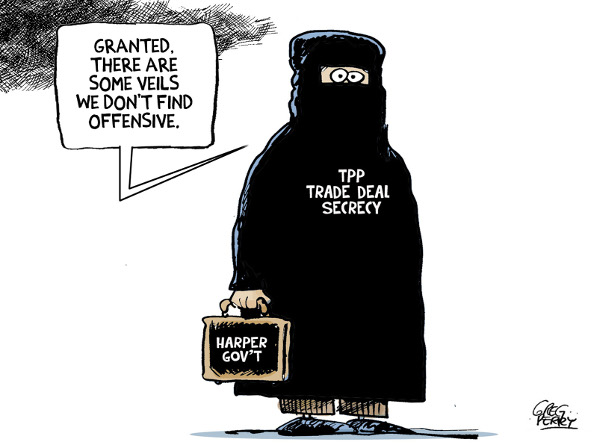The Trans-Pacific Partnership (TPP), a massive trade agreement that covers nearly 40 per cent of world GDP, wrapped up years of negotiation earlier this month. The TPP immediately emerged as an election issue, with the Conservatives trumpeting the deal as a source of future economic growth, the Liberals adopting a wait-and-see approach (the specific details of the agreement are still not public), and the NDP voicing strong opposition.
The focal point of most TPP discussion in Canada has centred on two sectors: the dairy industry, who would experience a modest increase in competition and receive a staggering multi-billion dollar compensation package, and the automotive parts sector, which would face Asian-based competition as a result of new, lower local content requirements (the industry is also pressing for a compensation package).
Lost in the discussion over imported butter and Japanese-made auto parts are the broader implications of the TPP. New rules on corporate lawsuits could result in more claims by foreign corporations against the Canadian government over national policies or court decisions (pharmaceutical giant Eli Lilly is already suing the government for $500 million over Canadian patent rulings) and an extension in the term of copyright beyond the international standard would lock down the public domain for decades and potentially cost Canadians hundreds of millions of dollars per year.
One of the most troubling, but largely ignored effects of the TPP involves privacy. Privacy is not an issue most associate with a trade agreement, however, the TPP features several anti-privacy measures that would restrict the ability of governments to establish safeguards over sensitive information such as financial and health data as well as information hosted by social media services.
Your data in US hands
Two provisions are the source of privacy concern. First, according to the Canadian government's summary of the agreement, the agreement "prevents governments in TPP countries from requiring the use of local servers for data storage."
The restriction against local data storage -- often called data localization -- originates from Silicon Valley tech company frustration with a growing number of governments that want local data to remain within their jurisdiction. The reason for data localization requirements typically stem from mounting concerns over U.S. surveillance activities and the power granted to U.S. law enforcement under laws such as the USA Patriot Act.
The combined effect of these U.S. laws is that many users fear that once their information is stored in the U.S., it will be accessible to U.S. authorities without suitable privacy protections or oversight. Since U.S. law provides less privacy protection to foreigners, there is indeed limited legal recourse for Canadian data held in the U.S.
In response to these concerns, provinces such as British Columbia and Nova Scotia have enacted laws to keep government information (such as health data) within the country. The TPP is designed to counter these efforts by restricting the ability of governments to mandate local data storage.
Allowing cross-border data flows
The TPP also establishes restrictions on the ability to limit data flows across borders, with the Canadian government characterizing the provision as "protecting the free flow of information across borders." While stopping Internet content blocking would be an admirable goal, the TPP actually features provisions that might expand the ability of internet providers to block content.
Instead, the provision may target efforts to stop the transfer of personal information to countries with inadequate privacy protections. Last week, the European Court of Justice issued a landmark ruling that struck down an agreement between the EU and the U.S. on data sharing due to concerns over U.S. surveillance activities. As countries begin to embrace restrictions on data transfers solely to countries with adequate privacy protections, the TPP could restrict the ability of the 12 member countries to do so.
The TPP is likely to undergo much debate over the coming weeks as the public gets its first opportunity to assess an agreement negotiated almost entirely behind closed doors. That secrecy has meant that unexpected issues such as privacy have gone largely unexamined and may raise legitimate concerns as Canadians grapple with the hidden costs of the country's most far reaching trade deal. ![]()
Read more: Rights + Justice, Politics, Labour + Industry
















Tyee Commenting Guidelines
Comments that violate guidelines risk being deleted, and violations may result in a temporary or permanent user ban. Maintain the spirit of good conversation to stay in the discussion.
*Please note The Tyee is not a forum for spreading misinformation about COVID-19, denying its existence or minimizing its risk to public health.
Do:
Do not: